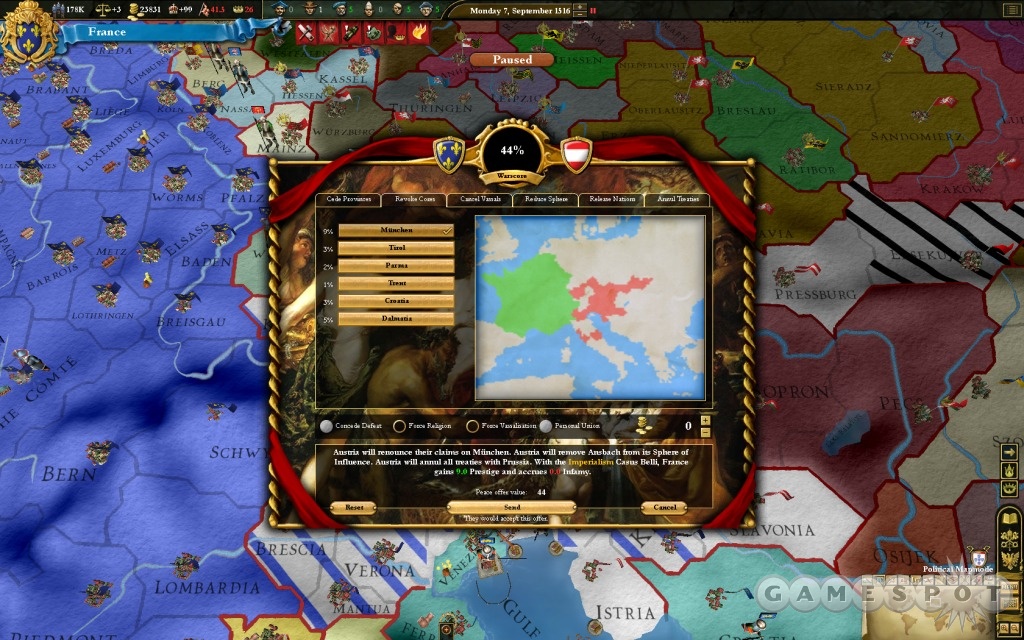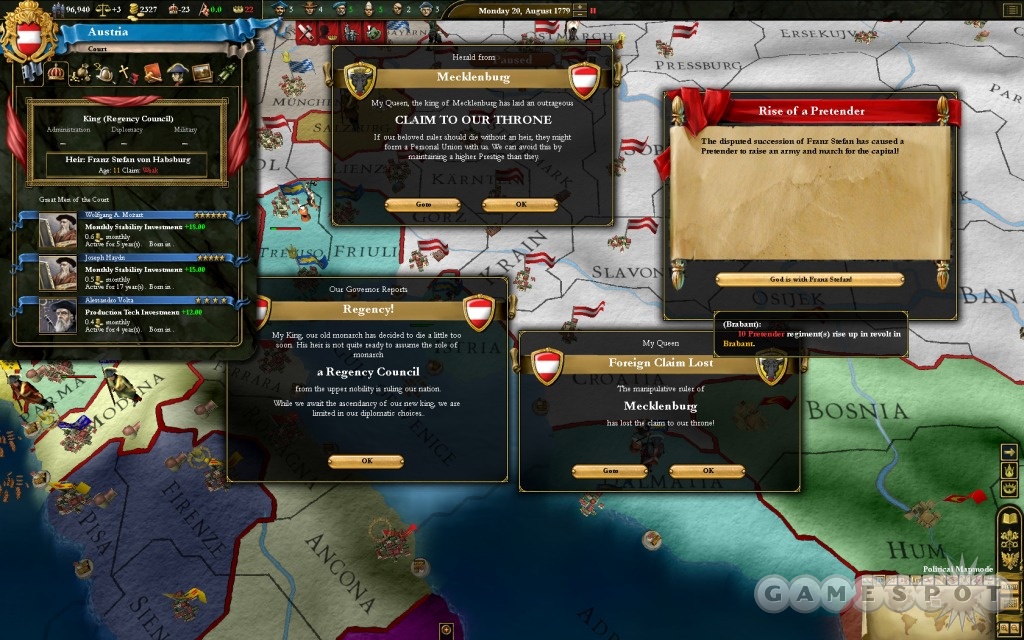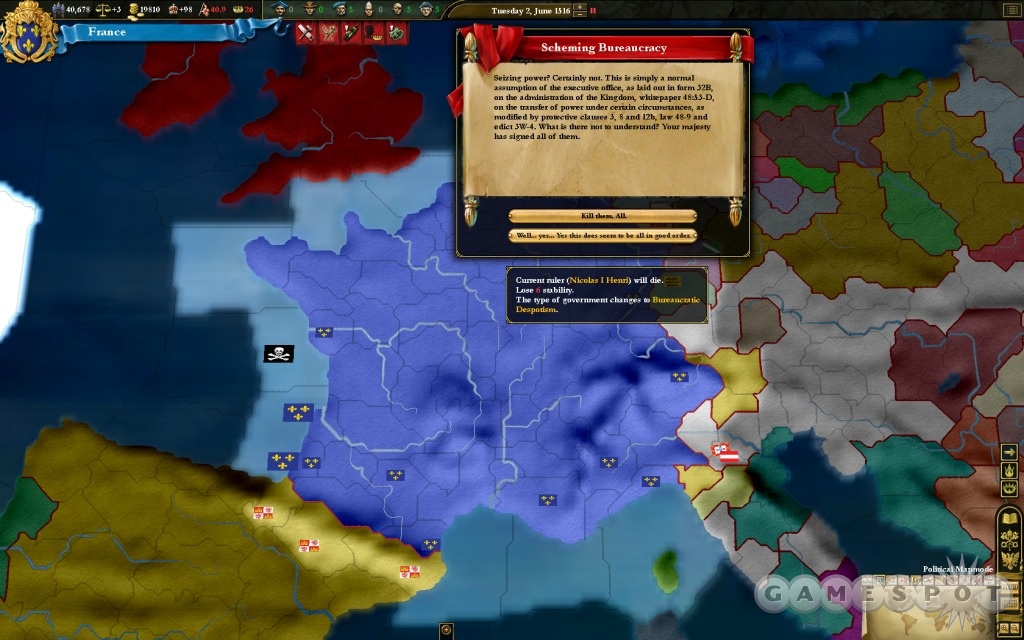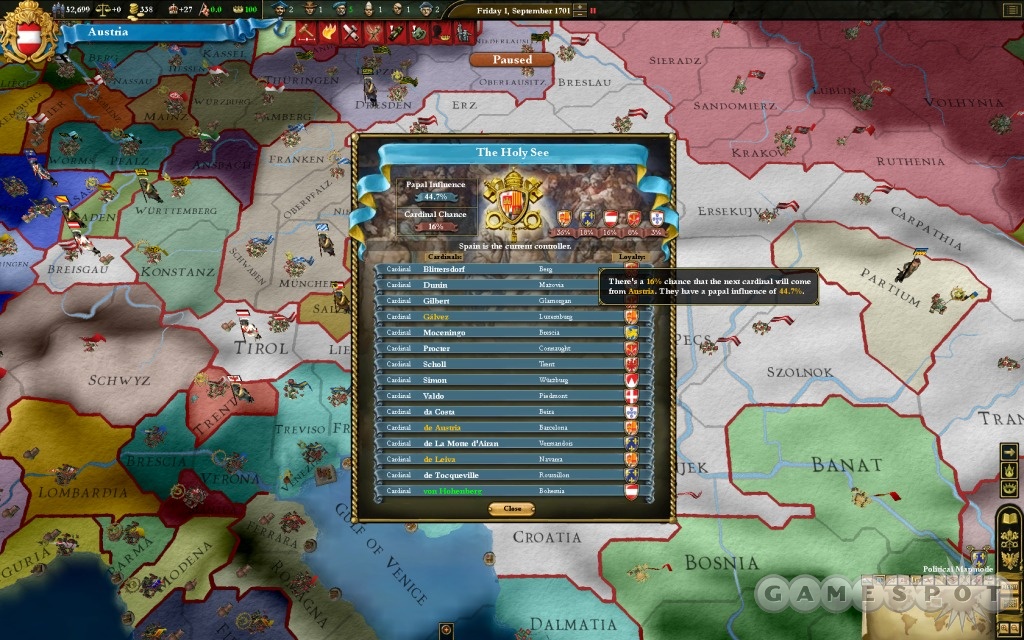The "complete edition" of 2007's historical grand strategy epic Europa Universalis 3--bundled with its first two expansions--was released over a year ago. At that time, EU3 felt complete, with its hundreds of playable countries, diverse options for intrigue and diplomacy, and a plethora of religious and colonial conflicts appropriate for its 1399 to 1820 timeline. However, the complete edition proved premature because the third expansion Heir to the Throne has just been released. Despite its deceptively small size--barely more than 15 megabytes--Heir to the Throne greatly improves upon EU3 by adding a new casus belli system, making combat more fun, occupying monarchs with dynastic dramas, and revising the internal politics of the Holy Roman Empire.

Diplomacy receives the biggest overhaul in Heir to the Throne, with war justifications and peace treaties getting the bulk of the attention. In EU3, your regime's stability would suffer if you launched an unprovoked war, so concocting a just cause--or casus belli--for your ruthless wars of conquest was advisable. Unfortunately, each casus belli had the same effect on stability, and no distinction existed between, for instance, waging a holy war or reclaiming stolen land. Thankfully, Heir to the Throne features a dozen different casus belli each of which now has a significant effect on how you wage war and make peace. This lowers the war score needed to force your enemy to yield to your legitimate demands in a peace treaty, and it also determines the international respect or hostility you gain by victory. For example, the Reconquest casus belli lets you annex your claimed territories without accruing any infamy; Canceled Loan makes demanding monetary reparations easier; and Religious Unity doubles the prestige you get for forcing your enemy to convert. Just as in the original EU3, you can still devise your own peace treaty regardless of your casus belli, but unjustified demands can seriously alienate your neighbors.
Warmongers will be pleased to hear that combat has been significantly improved in Heir to the Throne. Previously, in EU3, you were forced to play extended games of whack-a-mole with retreating enemy armies as they bounced from province to province like a ping-pong ball--always routed by your army, but never, ever dying. In contrast, armies in Heir to the Throne immediately surrender when they run out of morale, and they must stand and fight for several days before retreating, which means that you'll have time to get in some good licks. Also improved are the battles against pirates, who are no longer able to retreat from battle. Additionally, pirates tend not to spawn in sea zones near your fleets, which makes combating piracy much more manageable and allows you to concentrate on more important things like ridding the world of heathen religions. The elimination of cartoonishly resilient armies and pirates was sorely needed, making warmongering more fruitful and enjoyable. Why wasn't EU3 always like this?
Another improvement to an existing game mechanic is the reenvisioning of the Holy Roman Empire. As the leader of this loose confederation of central European states, the holy roman emperor can now gain imperial authority, a type of political capital that he can use to improve relations with member states or to modernize the empire's institutions. You can now turn the empire into a hereditary monarchy or even unify it as a single state, which makes being the emperor fun and engrossing, unlike in the previous system, in which the title of emperor merely conveyed a few statistical modifiers rather than a sense of purpose.
Also gaining a new sense of purpose is the College of Cardinals, whose members have given up their lust for worldly things and are now incorruptible. This means that you can no longer bribe them to elect your puppet as pope. The pontiff may still become your toady, which gives you stat boosts and the ability to have your rivals excommunicated, but you can only accomplish this by amassing enough papal influence. This is granted based on your policies, and if your government is sufficiently intolerant of heretics and heathens, then you will be quite popular with the Holy See. Overall, the influence system is a welcome change from the laborious micromanagement of cardinal bribing, but cynics with a sizable disposable income may prefer the old ways.

While foreign intrigues are an amusing diversion, monarchies must never forget their most important goal: the continuation of the dynasty. Monarchs now belong to dynasties that often rule over several countries at once, so if your monarch dies without an heir, you can be certain that a foreign cousin will pop up with a claim to the throne and an army ready to enforce it. However, having an heir does not guarantee peace and tranquility either, particularly if the heir is a bastard child from an unsanctioned union with a maid. For instance, a bastard king will likely see pretenders launch rebellions in an attempt to seize power, forcing you to divert your attention from bribing the holy roman emperor to suppress the insurgents. While monarchical dynasties are a great addition to EU3, they pale in comparison to the great dynastic dramas and family trees of Crusader Kings, an earlier Paradox game. Whereas in Crusader Kings, you could discreetly dispose of your barren, aging queen and marry a fertile young maiden to increase your chances of producing an heir, in Heir to the Throne, you don't get much of a say in the matter.
Also missing is the ability to influence your heir's characteristics through either genetics or upbringing, which would have been useful and fun. The worst part of dynastic gameplay occurs when the monarch dies but the heir is too young to rule. When that happens, your country will be run by a regency council until the heir comes of age, which could be up to 20 years away. Regency councils cannot start wars, so you may be unable to capitalize on all sorts of casus belli opportunities while patiently waiting for the heir to grow up.
Like monarchies, merchant republics have also been revitalized in Heir to the Throne, with the addition of the ability to create monopolistic trade leagues in which the members cooperate rather than compete and sell their goods exclusively in centers of trade owned by the league. Additionally, merchant republics can negotiate with other countries to obtain exclusive rights to a trade good, such as iron, slaves, or cloth. This means, for instance, that all of the iron produced in Austria would be sold in the merchant republic's trade centers. By utilizing these opportunities, merchants can get very wealthy in Heir to the Throne, but other countries can also improve their economies by designating a single province as their national focus, which grants substantial economic bonuses, as well as the ability to create a new center of trade in the region.

The revisions to diplomacy, warfare, and economics are complemented by an improved map and interface. Gone are the unsightly permanent terra incognita provinces--the enigmatic and untraversable white blobs that sullied vast tracts of Africa and the Americas. In Heir to the Throne, they have been replaced by wastelands, which you can explore but not colonize. This eliminates any ire you may have harbored for that menacing white blob perched eternally atop northern Siberia. Other changes to the map include giving the London province sea access, as well as the addition of a number of new map modes. These include an invaluable revolt risk view, which highlights the provinces most likely to revolt. In addition to the revised map, the interface has been greatly improved by new tool tips and icons that notify you when certain actions are available, such as when you can build better units or interfere in a neighboring country's dynastic crisis. The best interface addition of all is the new modifiers screen, which shows all of your country's currents modifiers and their effects.
The modifiers to your country's stats are still largely determined by the decisions that you implement, but this mechanic has been reworked. Decisions now require magistrates, a human resource like EU3's colonists, spies, and merchants. Your country generates magistrates at a rate determined by factors like the number of universities that you've built or the decisions that you've implemented. Regardless of how you get them, they tend to be scarce, which means that you'll often face tough choices like whether to spend all of your magistrates to build a single canal or to build roads in multiple provinces. Don't give too much power to your magistrates, however, or they may try to stage a coup--turning the government into a bureaucratic despotism.
Another addition to the decision mechanic is a whole new class known as the cultural decision. These can increase your country's cultural tradition, which is used to train special advisers to the monarch. Previously, you had to wait for providence to bestow your court with suitable adviser candidates, but now, you get the satisfaction of training only the adviser types that you actually need. Finally, you won't have to pray for a sheriff or ambassador to show up at your castle's door; instead, you can educate him at one of your country's universities.

The problems with Heir to the Throne are pretty minimal. The biggest problem is that the game requires EU3 and its first two expansions, which could dissuade people who don't already own the so-called complete edition. Additionally, one could interpret Heir's tiny download size as proof that it could or should have been a patch. However, Heir improves nearly every aspect of EU3 and offers more content than Napoleon's Ambition, the first expansion to EU3, so its small size belies the fact that it packs in a lot of improvements per megabyte. Heir is a much more significant upgrade than a mere patch. Whether these improvements are worth the $20 asking price is subjective, of course, but they do make EU3 significantly more enjoyable.
The plethora of improvements introduced in Heir to the Throne have made Europa Universalis 3 a more engaging and user-friendly experience. Particularly immersive are the new casus belli system, the revisions to combat, and the internal politics of the Holy Roman Empire. These features will give fans ample reason to spend countless additional hours kicking the Turks out of Byzantium, unifying the Holy Roman Empire, and taking Napoleon's Grande Armee out for a spin. Newcomers interested in Heir to the Throne should watch for the inevitable "Europa Universalis 3 Complete: We really mean it this time" edition. Whether or not this title sticks, strategy fans will find that the latest iteration of Europa Universalis 3 is a bona fide classic.